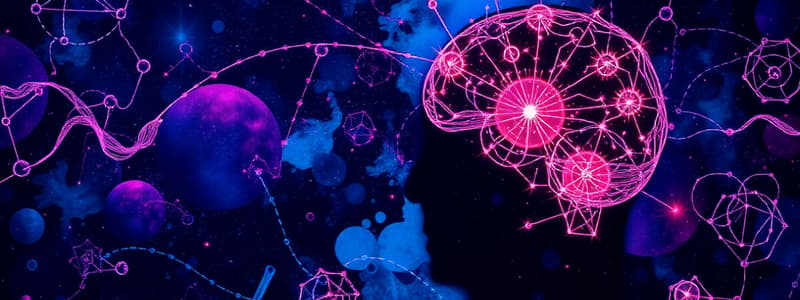Podcast
Questions and Answers
What distinguishes pseudoscience from legitimate science according to the demarcation problem?
What distinguishes pseudoscience from legitimate science according to the demarcation problem?
- Pseudoscience is peer-reviewed.
- Pseudoscience lacks falsifiability. (correct)
- Pseudoscience is supported by rigorous experimental evidence.
- Pseudoscience is compatible with the scientific method.
What does the term 'neuromyths' refer to?
What does the term 'neuromyths' refer to?
- Empirical evidence from neurological studies.
- True scientific facts about brain functions.
- Common beliefs in experimental psychology.
- Misunderstandings about brain research and its implications for education. (correct)
How does the 'Freud Problem' contribute to the perception of psychology?
How does the 'Freud Problem' contribute to the perception of psychology?
- It often leads to the spread of misinformation due to celebrity influence. (correct)
- It enhances the scientific credibility of psychology.
- It fosters rigorous testing of psychological hypotheses.
- It ensures that psychological theories are universally accepted.
What is implied by scientific realism?
What is implied by scientific realism?
What is the significance of 'truthlikeness' or verisimilitude in the context of scientific theories?
What is the significance of 'truthlikeness' or verisimilitude in the context of scientific theories?
Which of the following best describes parapsychology?
Which of the following best describes parapsychology?
Which of the following statements about scientific models is correct?
Which of the following statements about scientific models is correct?
What role does the 'truth' play in the evaluation of scientific claims?
What role does the 'truth' play in the evaluation of scientific claims?
What is a key characteristic that distinguishes scientific theories from non-scientific theories?
What is a key characteristic that distinguishes scientific theories from non-scientific theories?
What does the term 'falsifiability' mean in the context of scientific theories?
What does the term 'falsifiability' mean in the context of scientific theories?
Which philosopher is associated with the idea of falsifiability as a characteristic of science?
Which philosopher is associated with the idea of falsifiability as a characteristic of science?
What is a defining trait of currently viable scientific theories?
What is a defining trait of currently viable scientific theories?
How are new scientific findings typically evaluated before publication?
How are new scientific findings typically evaluated before publication?
What is implied by the statement that 'a theory that explains everything explains nothing at all'?
What is implied by the statement that 'a theory that explains everything explains nothing at all'?
How does reality respond to interactions based on true theories?
How does reality respond to interactions based on true theories?
Which of the following statements reflects an anti-realist view regarding scientific theories?
Which of the following statements reflects an anti-realist view regarding scientific theories?
Study Notes
Demarcation Problem
- Identified by Karl Popper, focuses on distinguishing science from pseudoscience.
- Falsifiability is the central criterion for solving the demarcation problem.
Pseudoscience
- Represents claims or practices that appear scientific yet contradict the scientific method.
- Examples include neuromyths, which are misconceptions about brain research and its implications for education.
The Freud Problem
- Famous figures can garner devoted followers, leading to the spread of misinformation.
- This phenomenon affects psychology's perception as a scientific discipline due to the influence of unfounded claims.
Pop Psychology and Parapsychology
- Pop psychology conveys psychological concepts lacking scientific basis.
- Parapsychology deals with entertainment-oriented psychology, focusing on alleged psychic phenomena.
Philosophy of Science
- Examines fundamental questions like “What is science?”
- Scientific realism posits that reality exists independently of human perception and beliefs.
Scientific Realism
- Asserts that unseen reality underlies perceptions, which can construct true or false descriptions of that reality.
- Examples of scientific models illustrating the deep structure include cell theory, DNA structure, and neuron functioning.
Truth and Verisimilitude
- Truth represents a correspondence between reality and its descriptions, allowing for evaluation of statements as true or false.
- Verisimilitude reflects the closeness of theories to the truth, evolving as new theories emerge.
Characteristics of Scientific Theories
- Highly tested, mature theories accurately describe the world and its workings and reveal the universe's hidden order.
- Reality responds predictably to interactions based on true theories while resisting false ones.
Anti-Realism
- Opposes the concept of objective reality, viewing theories merely as tools to navigate nature or subjective narratives.
- Claims that there is no objective truth, only constructs influenced by human thought and language.
Defining Characteristics of Science
- Testability: Scientific statements must be verifiable without subjective bias or personal claims of knowledge.
- Falsifiability: For a theory to be scientific, it must be able to be proven false, solving the demarcation problem.
- Karl Popper emphasized the importance of falsifiability in scientific discourse.
Theories and Hypotheses
- A theory consists of interconnected concepts that explain data and predict future outcomes.
- Hypotheses are specific predictions derived from broader theories.
Viable and Unfalsifiable Theories
- Viable theories have many confirmed hypotheses, while unfalsifiable theories can explain everything, leading to meaningless predictions.
- Sigmund Freud's theories about personality development are criticized for lack of falsifiability.
Scientific Publishing and Criticism
- New scientific findings require critique from the scientific community through peer review.
- The process includes manuscript development, editorial evaluation, and scrutiny from a panel of experts before publication.
Studying That Suits You
Use AI to generate personalized quizzes and flashcards to suit your learning preferences.
Description
Explore the concepts surrounding the demarcation problem as identified by Karl Popper. This quiz delves into key topics such as pseudoscience, the influence of famous figures in psychology, and the implications of pop psychology and parapsychology on scientific understanding.



